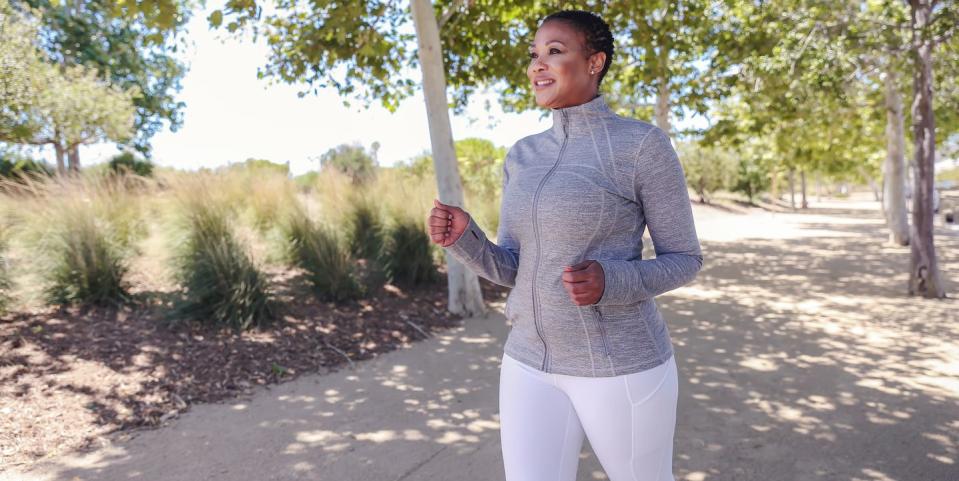Just 2 Minutes of This Exercise Could Lower Your Risk of Type 2 Diabetes, Study Finds

"Hearst Magazines and Yahoo may earn commission or revenue on some items through the links below."
New research found two minutes of walking can lower blood sugar and the risk of developing type 2 diabetes.
Researchers found that the impact of walking after a meal is best within 60 to 90 minutes after eating when blood sugar levels are at their peak.
Walking has a slew of health benefits including weight management, mood-boosting, and blood pressure control.
Sometimes it can be difficult to get in the full 150-minutes of moderate-intensity activity every week. Between meetings and making dinner, or cleaning the kitchen and preparing for presentations, movement can sometimes take a back seat. But, new research found that just two minutes of walking (yes, really!) can have a positive impact on your blood sugar levels and potentially ward off type 2 diabetes.
A meta-analysis of seven studies, published in the journal Sports Medicine, examined the impact of sitting for long periods of time compared to either light-intensity walking or standing on cardiometabolic health markers.
Study participants were either placed in a walking or standing group and were instructed to walk or stand for two to five minutes every 20 to 30 minutes over the course of one day. Two of the seven studies included participants with and without diabetes. The remaining five included participants without any history of diabetes. Researchers found that even these few minutes of slow walking were enough to create a drop in blood sugar levels.
Specifically, walking within 60 to 90 minutes after eating (when blood sugar levels are at their peak) was associated with more gradual changes in blood sugar levels compared to sitting or standing. This is important for those with prediabetes or another type of diabetes looking to avoid dramatic blood sugar swings.
Researchers measured heart health through systolic blood pressure (the higher number that represents the force at which the heart pumps blood around the body), postprandial glucose (a measure of glucose in your bloodstream within four hours of eating a meal), and insulin (the hormone that regulates blood sugar).
The study did not find any significant influence on insulin or blood pressure. Additionally, the research found standing also helped lower blood sugar levels, but not to the same degree as walking.
“Studies have clearly shown that moderate exercise, including simply walking, after a meal can lower the surge in blood sugar that follows eating,” says Nick West, M.D., chief medical officer and divisional vice president of global medical affairs at Abbott. “In people with diabetes, this has translated into better glucose control, which in the long run, could translate into reduced complications from the disease.”
He notes, “The timing of the exercise, however, is important. The optimum window is one to one and a half hours after a meal, which is when blood sugar levels peak in the bloodstream.”
The bottom line
If you’re thinking about adding an after-dinner walk to your regular routine, Dr. West says it’s a great idea for more than just blood sugar benefits. “Notwithstanding the recently described benefits in blood sugar control and diabetes prevention, exercise, in general, is good for cardiovascular heart health and conditioning, and can help to maintain a healthy body weight which in itself is important for a variety of reasons.” He adds walking after a meal can even improve bloating and gas; and in the evenings, improve sleep.
In fact, there are so many benefits to walking every day. Additional research has found that just 10 minutes of walking can improve your mood and another study found regular walking can help reduce body fat and improve your body’s response to insulin. Plus, studies have connected regular walking with lower blood pressure, and another study found walking improved cardiovascular health.
Dr. West warns that too vigorous exercise too soon after meals can cause some indigestion and abdominal pain, so it’s best to choose the intensity of your post-meal movement carefully and consider the size of your dinner.
In short, add a short walk to your post-meal schedule and find ways to make walking fun for you, like grabbing your best walking shoes, your favorite podcast, your dog, or a friend to get moving after meals!
You Might Also Like
